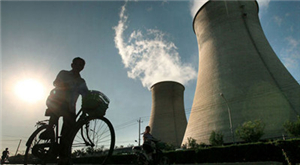Health leaders call for concerted action on climate change
China.org.cn / chinagate.cn, December 10, 2014 Adjust font size:
After the first week of the current UN climate talks in Lima, health professionals, public health experts and policymakers convened yesterday for the 2014 Climate and Health Summit.
The packed program featured inspiring speakers such as Peru's Minister of Health, Aníbal Velasquez Valdivia, the Vice President of the World Bank, Rachel Kyte and ex IPCC Lead Author Saleemul Huq. It called for a fair and legally binding global climate agreement to be agreed at COP21 in Paris in 2015 in order to protect and promote human health.
Co-hosted by the Global Climate and Health Alliance, the School of Public Health at the Universidad Peruana Cayetano Heredia, the Pan-American Health Organization, World Health Organization, and the German Gesellschaft für Internationale Zusammenarbeit (GIZ), the Summit convened many of the major health organizations leading action on climate change. It explored the health impacts of our changing weather and rising seas, and how governments can simultaneously cut emissions and enable healthier lives for their citizens.
The Lima climate talks (COP20) follow shortly after the release of the Intergovernmental Panel on Climate Change (IPCC)'s latest report, which highlighted the profound health risks from unmitigated climate change. These risks include an increase in heat stress, health effects of increased ground-level ozone, and the growing risks to physical and mental health from worsening extreme weather events, such as Typhoon Hagiput.
Alongside more direct impacts such as those from heat and extreme weather events, climate change also affects health less directly, through the damage it inflicts on ecosystems and the economy. For example through increases in infectious diseases, increased malnutrition due to reduced crop yields, and indirect impacts from loss of livelihoods, displacement and civil unrest or conflict.
Titled, 'Investing in Health', the Summit focused not only on these threats but also on the need for a dramatic scale-up of investment in projects which reduce emissions, benefit health and improve climate resilience. The Summit program covered topics from the health impacts of air pollution – which the WHO estimates causes 7 million early deaths per year – to greening the health sector and healthy, sustainable cities. Speakers emphasized the health benefits and cost savings from reducing fossil fuel use, echoing the latest IPCC report's conclusion that, to avoid catastrophic climate impacts, we must phase out fossil fuels entirely in favor of low-carbon technologies over the coming century.
2014 saw a growing mobilization of health professionals calling for urgent action on climate change in order to protect public health, with the World Health Organization convening Ministers of Health at the first ever international Health And Climate Conference in August, and hundreds of health professionals joining others at climate marches in New York and around the world this September. The Lima Climate and Health Summit sent a clear signal that health professionals everywhere are increasingly demanding fair, ambitious national international climate policies which prioritize public health.
"There are so many known opportunities to simultaneously reduce the threats of climate change to our wellbeing and improve the health of millions - a rapid reduction in energy use through improving efficiency, and transition to clean, safe energy; greening our cities; cleaning the air and improving our health by walking and bicycling more. Countries around the world can aim for a healthy future for all," said Dr. Linda Rudolph, U.S. Climate and Health Alliance.


